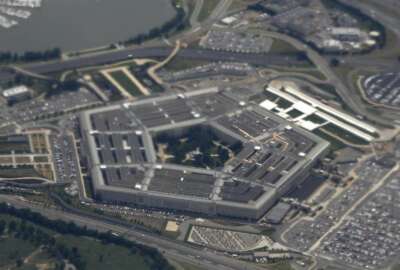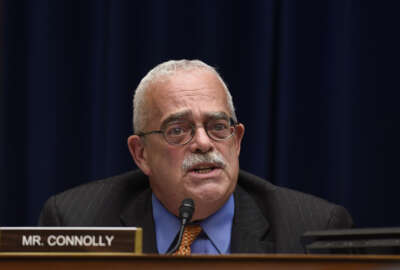To listen to the Federal Newscast on your phone or mobile device, subscribe on PodcastOne or Apple Podcasts. The best listening experience on desktop can be found using Chrome, Firefox or Safari.
- Maintaining a large enough staff to ensure nuclear reactors are safe from cyber attacks is going to be a challenge. The Nuclear Regulatory Commission’s inspector general said a third of NRC’s inspectors will be eligible to retire in 2020. Much like other agencies, attrition is far outpacing hiring. The IG also said making cyber inspectors conduct audits of other, non-cyber related areas makes it difficult to keep up with the latest in cyber security expertise. The office recommended NRC utilize the Strategic Workforce Planning Initiative to help address some of these issues. (Nuclear Regulatory Commission Office of Inspector General)
- Eighty-five percent of senior executives and risk managers say they could envision a serious threat or disruption at their agencies within the next two to three years. According to a new survey from the Senior Executives Association and Association for Federal Enterprise Risk Management (SEA-AFERM), 20% say they’ve already experienced a serious crisis within the last three years. Both organizations surveyed their members about their agencies’ level of preparedness to deal with risk. Sixty-three percent of SEA-AFERM respondents say they’re agencies are implementing enterprise risk management programs. (Association of Federal Enterprise Risk Management)
- With the U.S. Postal Service facing major financial challenges, Postal Regulatory Commission Chairman Robert Taub is urging lawmakers to rethink USPS’ business model. Taub said further defining the agency’s universal service obligation, would be the single-most important legislative fix for the agency. The universal service obligation outlines the minimum service standards the Postal Service has to meet. Right now, the obligation mandates six-day delivery.
- House Veterans Affairs Committee Chair Mark Takano (D-Calif.) wants more answers from U.S. Immigration and Customs Enforcement about its policies on non-citizen veterans. He wrote to acting ICE Director Mark Morgan, after the Government Accountability Office found ICE couldn’t quantify how many non-citizen veterans are being deported. GAO said ICE isn’t consistently elevating immigration cases involving veterans, as policies usually require. (Rep. Mark Takano)
- The General Services Administration wants vendors to sign up for a customer experience hackathon later this month. The first-place winner can receive more than $12,000 for their idea to optimize GSA applications for its customers. The hackathon will take place at eight GSA locations across the country on June 19. Judges will score each entry based on usability, emotional response and the ability to send feedback. (General Services Administration)
- It’s time for vendor and agency customer input on GSA’s effort to consolidate its schedule contracts. As part of its two-year effort to modernize its $31 billion schedules program, GSA is standardizing the terms and conditions by which vendors abide. To that end, GSA wants to know what vendors think those terms and conditions would look like. GSA released a request for information seeking input across two areas: The proposed format of the consolidated schedules, and what the updated terms and conditions would include. GSA said they want the terms and conditions to be current, accurate, complete and consistent, while maintaining flexibility for category or Special Item Number specific requirements. Responses to the RFI are due by June 21. (FedBizOpps)
- Paying Air Force pilots their yearly bonuses up front could keep them around longer. A new study from the RAND Corporation says giving pilots a lump sum for their yearly bonuses rather than monthly increments is more appealing to them. The study came from an Air Force proposal to raise the bonus from $35,000 to $43,000. (RAND Corporation)
- Things are booming for the U.S. aerospace industry. A new report from the Aerospace Industries Association says aerospace and defense represented $929 billion of economic output in 2018. Industry wages also increased by 7.7% in 2018 compared to 2017.
- The Defense Department said it has started negotiations with its unions on its plans to transfer more than 1,000 IT workers to the Defense Information Systems Agency. The move came a week after the American Federation of Government Employees charged DoD with unfair labor practices for failing to consult with unions about the changes. DoD said the consultation period will last 30 days. Officials have previously said the transfers, which affect 1,200 employees from more than a dozen Defense agencies, would take effect on Oct. 1. No word yet has been given on whether that timeline will change. (Federal News Network)
- A new amendment to the House’s proposed 2020 National Defense Authorization Act, would require the Pentagon to turn up its study of how climate change will affect military operations. Roll Call reported the measure, introduced by Rep. Jason Crow (D-Colo.), will be included in the House’s final version of the bill. Crow also separately introduced legislation early last week, which would require officials at large and medium military bases to consider climate change and extreme weather when drafting so-called “master plans” for their facilities.
Copyright
© 2024 Federal News Network. All rights reserved. This website is not intended for users located within the European Economic Area.




